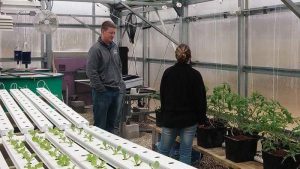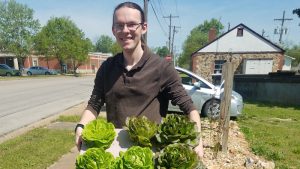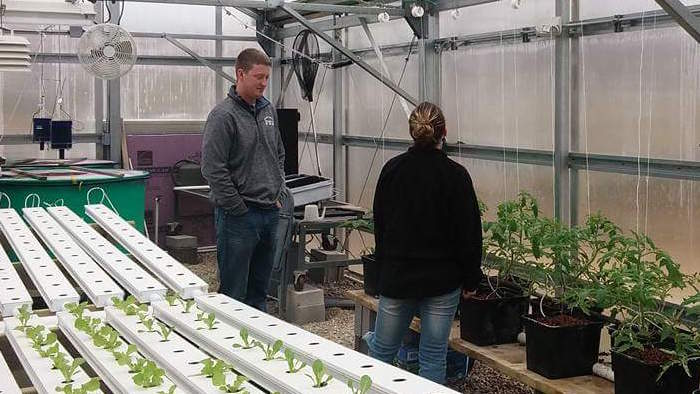Some of the best jobs in rural America involve the natural areas that make up the heart of these regions. Missouri State University-West Plains offers two degrees that will prepare students to fill a variety of roles, from agribusiness and plant science to natural resources and wildlife management. They are the Associate of Applied Science (AAS) in General Agriculture and the Associate of Science (AS) in Agriculture.
What can you do with a degree in agriculture? The opportunities are many and varied! “Animal science majors are involved with production agriculture as farm and ranch managers. They can work in the livestock feed industry in production, development, quality control, or distribution and management. Animal science graduates can also work in processing plants, inspection services and government agencies,” Associate Professor of Agriculture Linda Wulff-Risner said. “Forestry, natural resource management and wildlife management graduates are headed for careers in timber management, working with the Department of Natural Resources, or state and National Park Systems.”

If you loved vocational agriculture and Future Farmers of America (FFA) in high school, Risner also says there is a continuing demand for vocational agriculture instructors and agribusiness graduates. This can easily transfer to careers in equipment industries sales, management, marketing, public relations and customer service positions.
The Associate of Science in Agriculture
The AS in Agriculture degree is intended to transfer as a block to four-year public colleges and universities in the state of Missouri. Students with the AS can go into these institutions with junior standing and virtually all of their freshman and sophomore general education requirements completed. Many private colleges and universities in the state also honor the AS degree, Risner says.
This degree also prepares students for the Bachelor of Science in General Agriculture degree. It is offered through distance learning classes at the West Plains campus from Missouri State University-Springfield so students can complete the four-year degree without moving to a larger institution.
The AS in Agriculture degree also is structured so that it can lead into many different pathways beyond general agriculture. It can provide the basis for a transition into pre-veterinary, agriculture education, natural resources and animal science.

The Associate of Applied Science in General Agriculture
Students enrolled in the AAS in General Agriculture degree don’t typically transfer. Study areas include a general education component and major requirements in food security, biology and chemistry. Students can then select from specialization groups including agricultural business, animal science, general agriculture, natural resources, plant science and wildlife management.
Career possibilities range from a farmer, rancher or farm manager to an agricultural technician supervisor at a greenhouse or nursery. Farmers and ranchers grow and cultivate crops and raise and breed animals for the nation’s food supply. Farm and agricultural managers, as well as greenhouse and nursery managers, oversee the daily operations, carrying out production, financial and marketing decisions based on the owner’s guidelines. Agricultural technicians work with agricultural scientists in food, fiber and animal research, production and processing. Under a scientist’s supervision, they will conduct tests and experiments to improve yield and quality of crops or to increase the resistance of plants and animals to disease or insects.
What’s the difference?
The AS in Agriculture degree is for students wanting to start their four-year baccalaureate program in a smaller college but plan to transfer to a four-year institution to complete their program.
The AAS in General Agriculture is for people who are anxious to enter the work force in a rewarding career. It is a blend of general education classes and focused agriculture courses that can be completed in two years and prepares students for entry level to mid-level careers.

Student Perspectives
“I am pursuing this degree because I want to transfer and start on the path to being a veterinarian. An agriculture degree can take you many different places, and I hope it will give me a basis for the veterinary field,” student Jerica Will said. “My favorite class would have to be the Veterinary Science class. Professor Risner likes to do a lot of hands-on work that goes along with a farm, which I have always found very interesting.”
“This degree is a subject that I can relate to,” student Dessa McBride said. “I enjoy being outdoors and love animals. It is what I enjoy and it will hopefully allow me to further my degree to be veterinarian technician. For my favorite classes, there are too many to list. I have enjoyed the opportunity to further my education here in my hometown. It allows me to take care of my family, but also get my education.”
Career Outlook
There is a high demand for college graduates with a degree in agricultural programs. An average of nearly 60,000 high-skilled agriculture and related job openings are expected annually in the United States over the next five years, with only about 35,000 graduates in food, agriculture, renewable resources or the environment graduating each year to fill them, according to data from the U.S. Department of Agriculture and Purdue University.
Risner also says to look no further than the healthy food movement rising, where consumers desire to know where their food was produced. This has resulted in many plant science and horticulture jobs.
For more information about the AS in Agriculture and the AAS in General Agriculture degrees, contact Risner at 417-255-7236 or by email.

